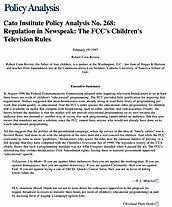All this suggests that the politics of the presidential campaign, where lip service to the idea of “family values” was a favored theme, had more to do with the adoption of the rules than did a real concern for children. And while the FCC represents its rules as mere “guidelines,” broadcasters who ignore the rules bear the ominous burden of proving, in a full hearing, that they have complied with the Children’s Television Act of 1990. The legislative history of the CTA clearly shows that such a programming mandate was not what Congress intended when it passed the act. The FCC’s rulemaking also violates broadcasters’ First Amendment rights, forcing them to transmit government-approved “educational” speech.
Regulation in Newspeak: The FCC’s Children’s Television Rules
In August 1996 the Federal Communications Commission adopted rules requiring television broadcasters to air at least three hours per week of children’s “educational” programming. The FCC provided little justification for imposing that requirement. Studies suggested that most broadcasters were already airing at least three hours of programming per week that would qualify as educational. And the FCC’s order ignores the educational video programming for children that is available on media that compete with broadcasting, such as cable, satellite, and videocassettes. Finally, the theory behind the mandate is that the market will not provide educational programming on its own because the audience does not demand it–another way of saying that such programming cannot attract an audience. But that also means that mandates are not a solution, since the FCC cannot force anyone who would not already have done so to watch educational programming.
Syllogisms à la Mode–If you are against labor racketeers, then you are against the working man. If you are against demagogues, then you are against democracy. If you are against Christianity, then you are against God. If you are against trying a can of Old Dr. Quack’s Cancer Salve, then you are in favor of letting Uncle Julius die.
– H. L. Mencken[1]
FCC chairman [Reed] Hundt has set out to wear down his colleagues’ opposition to his proposal [to require broadcast licensees to transmit three hours per week of children’s educational programming] in part by accusing them of waging a campaign against kids.
Cleveland Plain Dealer[2]
On August 8, 1996, the Federal Communications Commission adopted new rules requiring television broadcasters to air more children’s educational programming. Less than three weeks later, the Food and Drug Administration announced that it would assert jurisdiction over cigarettes and adopted rules to sharply curtail tobacco advertising. Judging by the growing number of regulations of media content that are being justified by the perceived need to protect minors, it takes a child to raze the constitutional rights of a village.
Despite the government’s characterization of its regulatory action as merely setting “guidelines” to assist broadcasters with compliance, it is clear that the FCC’s rules establish programming mandates that a licensee may ignore only at its peril. The lack of justification for the requirements and the twisted logic on which they are based suggest that the recent presidential campaign, in which “family values” were the Holy Grail, better explains the rules’ development than does a genuine concern for children or education. In addition, the three-hour programming requirement exceeds the FCC’s statutory mandate under the Children’s Television Act of 1990 and encroaches on broadcasters’ First Amendment rights.

This work is licensed under a Creative Commons Attribution-NonCommercial-ShareAlike 4.0 International License.

